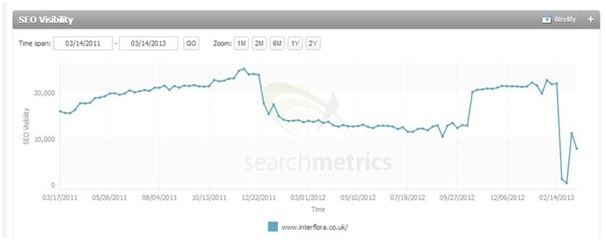
Google and the Interflora fiasco
Interflora is best known as one of the UK’s most popular florists, not for getting into trouble with online regulations. Recent escapades revealed by, Google, portrayed a very different light. If you’re not familiar with the incident, Interflora practically disappeared from Google’s SERPs, losing ranking for hundreds of brand and non brand search terms.
‘Black hat’ link building conducted by Interflora’s SEO agency created headline news nationwide and a Google penalty to boot. Although, the official standpoint from Google was “no comment”, Head of Search Spam, Matt Cutts, warned SEO professionals any evidence of paid links will be met with disciplinary action1. Indicating Interflora’s catalogue of poor backlinks2 and advertorials on online editorials and low quality blogs was the cause of the penalty.
Image credit: searchmetrics.com
It emerged Interflora sent free bouquets to webmasters in a hunt for links, deleting ‘no follow’ tags as they went along. This wasn’t just a select group of websites either; they sent hundreds of bouquets, garnering a vast quantity of backlinks and in some cases paying for them.
Using advertorials to gain SERPs without using a nofollow tag is not good SEO practise. Unfortunately, this was conducted on a range of high quality online editorials, affecting Interflora and the domains carrying Interflora links. Consequently, both parties lost significant PageRank and one victim, The Independent.co.uk, fell from PageRank 8 to 4 within days3. In response to the nightmare, the SEO company managing the Interflora account contacted all the websites who received bouquets requesting link removals, prompting bloggers who hosted their content to tweet their confusion4.
Interflora, has since regained visibility on Google SERPs both for brand related terms and non brand search terms. Learning from this valuable lesson, Oban Multilingual, one of the leading international SEO companies believe these tactics should never have been undertaken and was plagued by its strategy from the very beginning. To sustain visibility on SERPs abiding by Google’s rules is imperative in maintaining a level of honesty to your brand equity.
So, what has been learnt from the Interflora fiasco? Firstly, paid links is not the way to gain a foothold on Google SERPs. You may get an initial spike in ranking – as Interflora wanted in the run-up to Valentine’s Day – but those ‘black hat’ links will cause problems long term. One independent analysis showed around 70% of Interflora’s backlinks to be suspicious or toxic, indicating significant poor link building activity5.
The problem that occurred wasn’t sending products to bloggers for review. Google heartily endorses blogger outreach, as demonstrated in a promotional video starring satchel entrepreneur Julie Deane6. But getting every website to post links, regardless of quality and genre, will end badly in terms of search and integrated PR. Moreover, paying websites to feature your product with a link is a breach of Google’s Terms & Conditions.
Despite, being made an example by Google for wrangling thousands of poor quality links and being wiped off SERPs, Interflora was hastily brought back into ranking. This ‘forgiveness’ from Google was significantly quicker than most penalised websites. Needless to say, webmasters are fuming that major brands like, Interflora, could recover so quickly from this severe penalty, while smaller sites take months to regain rankings.
In the hours following the Google penalty thousands of Interflora links were removed to rectify the situation. After all, brands with an online presence can’t afford to lose natural search ranking. It’s never cost effective chasing link removals and if you’re tempted by ‘black hat’ tactics, be sensible. Distributing low grade links is a ‘quick fix’ bound for a Google penalty destination.
The main lesson learnt is there is no shortcut for good link building – quality links cannot be bought or manipulated. Marketers conducting blogger outreach campaigns for link building should only use bloggers relevant to the brand and creative campaign. Working with high SEO value bloggers that are genuinely interested in your brand is far greater in value. Those who are only interested in payment are not just in breach of Google’s rules, but compromise the integrity of their website. Creating a blogger network might take time, but delivering powerful backlinks that generate positive PR coverage will enhance your brand propositions to a greater extent.
———-
1 Search Engine Land
2 Link Research Tools
3 Tann Westlake
4 Search Engine Land
5 Link Research Tools
6 YouTube
